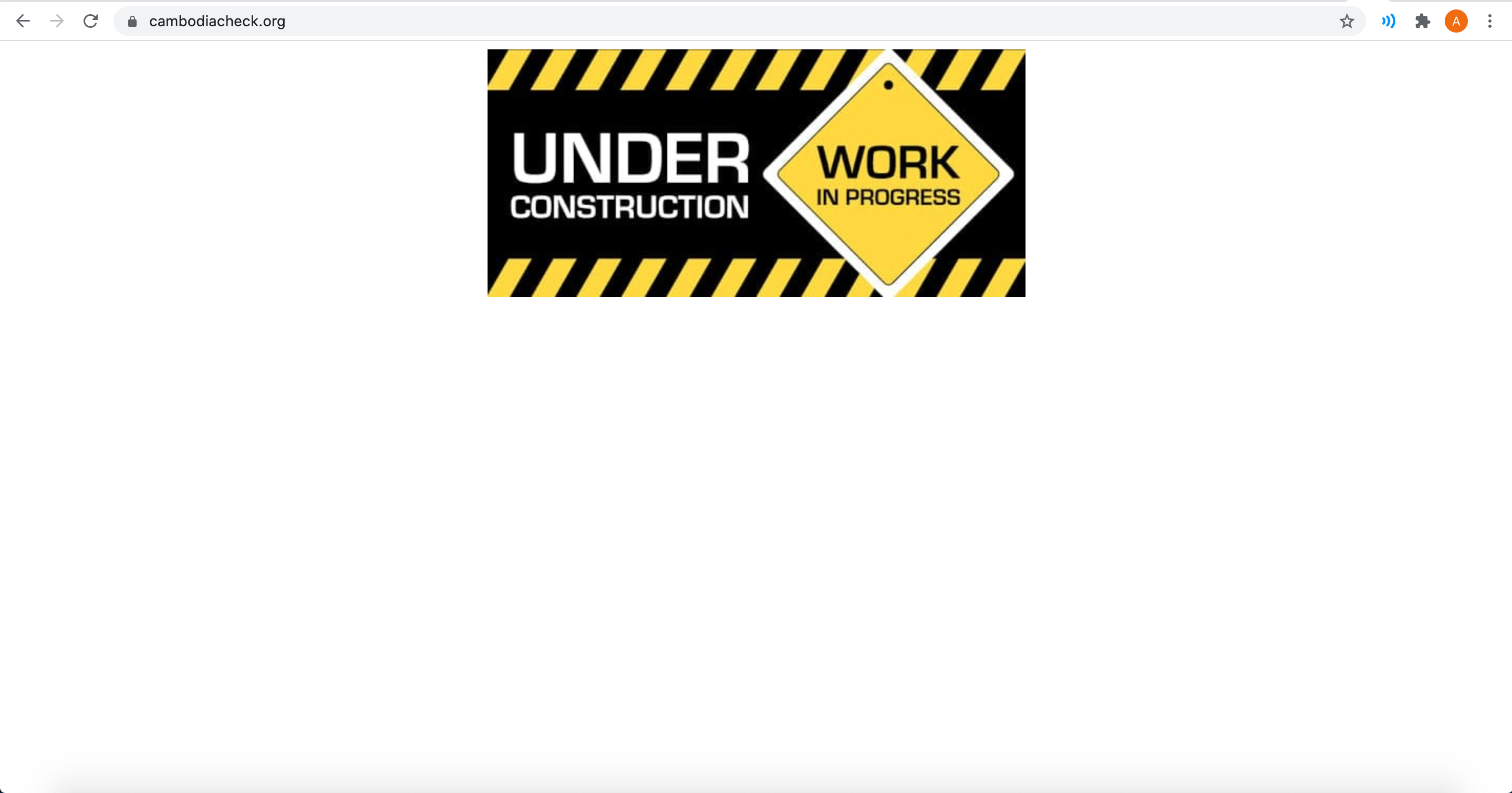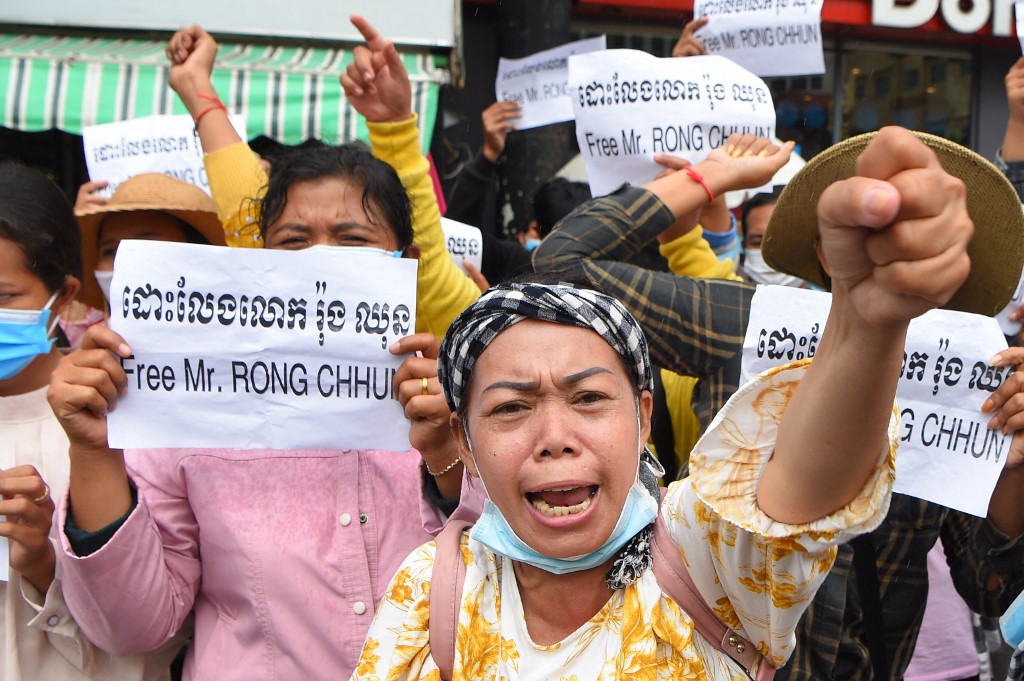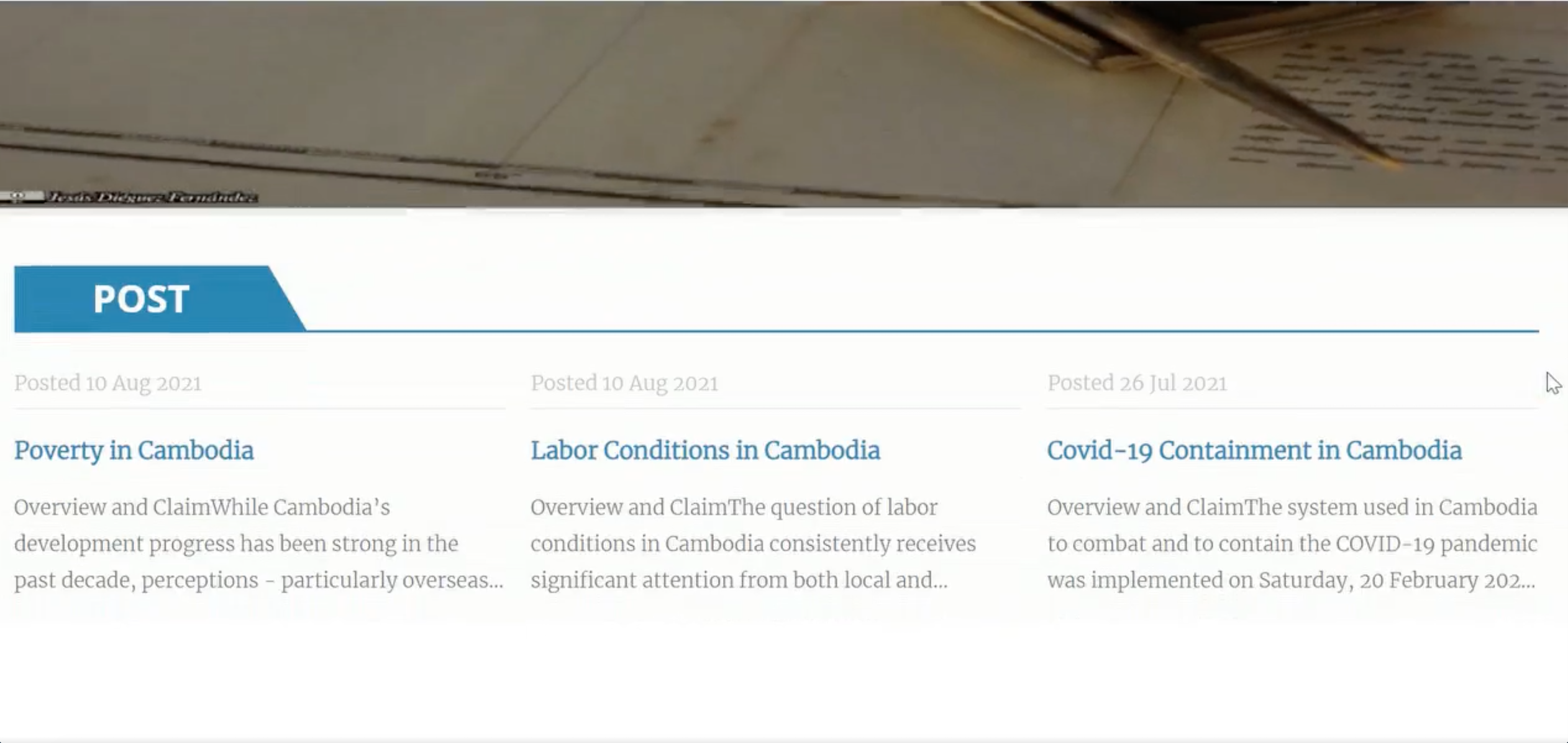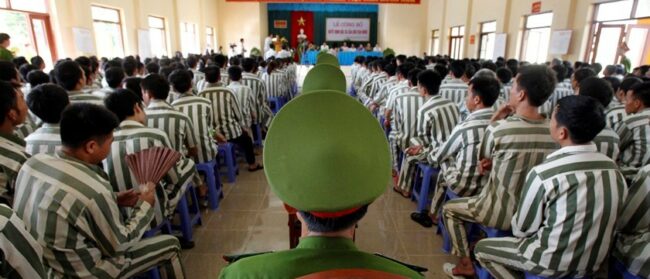Additional reporting from Jack Brook and Samphors Sao
Visit the CambodiaCheck website today and you’re greeted with a yellow-on-black “Under Construction: Work in Progress” sign. In reality, the work in question has come and gone, the short-lived fact checking scheme having already met its untimely demise.
First announced in April this year, the US Embassy-funded project was launched with an online press conference on July 27. It aspired to “counter misinformation about Cambodia, helping to promote better image and understanding of the kingdom” ahead of the country assuming the role of ASEAN chair in 2022.
But it would be less than a month later, on August 25, that CambodiaCheck’s website would greet visitors with an alert announcing the project’s cessation. Having released only three of five planned articles, the end was marked, somewhat ironically, with a vaguely worded statement that revealed little about the true nature of what unfolded:
“Thank you for visiting the CambodiaCheck digital platform, a six-month pilot initiative to mitigate misinformation in the context of Cambodia. Implemented as a limited, time-bound activity by The Asia Foundation in partnership with Cambodian Institute for Cooperation and Peace [CICP], the project has since concluded.”
A week later, even this was gone – and along with it any trace of the small body of heavily criticised research produced over the project’s short life. Wiped from existence, swept under a digital rug, its backers were seemingly keen to pretend CambodiaCheck had never happened.
But while the virtual legacy of this brief misadventure may now be limited to one VOD article and the two announcements on the CICP website, CambodiaCheck’s enduring message could serve as a cautionary tale for foreign donors in the Kingdom. However brief its existence, the project illustrated the limitations of operating a truth-finding mission within Cambodia’s system of implicit red lines and unspoken boundaries – one that has hardened since the only viable political opposition was dismantled in 2017.
In a tightened democratic space with limited tolerance for free expression, the Cambodian government has taken up the mantle as the ultimate fact-checker in its much-publicised war on ‘fake news’. For CambodiaCheck, those political considerations jeopardised its underlying purpose, with its fact-seeking mission serving only to vindicate official narratives.
Phil Robertson, deputy director of Human Rights Watch’s Asia Division, told the Globe he could see the appeal of a fact-checking project in theory. However, he added, the reality of such a programme in today’s Cambodia was fraught from the beginning.
“These kinds of projects sound very attractive to donors – [someone promising] ‘hey, we’ll do some impartial fact checking thing, this will encourage more responsible reporting and behaviour’,” he said.
“‘But I think there’s just a certain degree of naivete about the very difficult aspects of such a project in Cambodia.”

These “difficult aspects” of fact checking are aplenty in Cambodia, with recent years witnessing ‘fake news’ become a hot-button topic in the Kingdom. The concept has justified the arrest and jailing of government critics within the context of a wider tightening of power from the ruling Cambodian People’s Party (CPP) since 2017, when the country’s only viable opposition was dissolved and independent media sources clamped down upon.
In March 2020, the Ministry of Information established its Fake News Committee, a move it said was necessary to monitor the spread of misinformation on social media and block information that causes social unrest. Last month, on August 6, it was reported that of the 1,061 instances of identified “fake news” so far this year, 910 were for inciting criticism of the government or allegedly insulting the Kingdom’s leaders.
“There has been a political weaponisation of the fake news narrative [in Cambodia],” Robertson said. “Ever since Hun Sen first heard Donald Trump scream about fake news, he had a fit of ecstasy because he realised that this was going to be his meal ticket.”
They presumably wanted to get a topic that dealt with HRW, but that was not something that was as important as something like [jailed activist] Rong Chhun or political activists or dissidents
Still, Robertson’s assessment of CambodiaCheck is not an entirely impartial one. To the surprise of a small band of journalists and Cambodia watchers on Twitter, his organisation proved the subject of the project’s first publicly released fact check on July 26.
The since-removed inaugural post, Covid-19 Containment in Cambodia, sought to refute a claim made in April by the rights group that the Cambodian government’s QR code-based Covid-tracking system, Stop Covid, was “ripe for rights abuses” given the CPP’s record of surveilling opponents. Citing the fact the Covid-19 tracking scheme is voluntary, as well as an apparent lack of evidence of government abuse, the claim was unequivocally “deemed to be false” by CambodiaCheck.
But for Robertson, the assessment was flawed, and predicated on a misrepresentation of his group’s original statement.
“The wording of the actual press release, we’re careful,” Robertson said. “We’re talking about the potential for problems based on an ongoing track record of online surveillance and abuses in Cambodia, we said that very clearly.”
With no shortage of potential fake news amid a Cambodian media landscape populated by infamously inaccurate, pro-government news outlets – the Khmer Times and Fresh News most prominent among them – the spotlighting of this claim was a striking choice for many.
For his part, Bradley Murg – a US academic associated with Cambodia for two decades, and a CICP senior research fellow who helped develop CambodiaCheck’s methodology – defended the decision. He told VOD soon after CambodiaCheck’s first post that researchers were concerned with “objectivity not subjectivity, so when we fact-checked that [HRW], it’s about the claim, not about the person and not about the entity itself”. Murg directed the Globe’s enquiries to the Asia Foundation when asked for materials from the now-pulled website.
But while stopping short of calling foul play, Robertson sees more strategic motivations behind the project’s choice of topic.
“They presumably wanted to get a topic that dealt with HRW, but that was not something that was as important as something like [jailed activist] Rong Chhun or political activists or dissidents,” he said.
“This looked like an easy target to them, with the idea of getting HRW so that the government thinks, ‘Hey, we’re balanced and we’re willing to go after just about anybody’.”

Any lingering hopes that this first post would simply prove a pragmatic entry into the world of fact checking were soon dashed, with follow up publications similarly questionable in approach and conclusion.
On August 4, CambodiaCheck targeted a single line published by Reuters in April suggesting “Cambodia is one of Asia’s poorest countries”.
The seemingly innocuous claim, written by Cambodian journalist Prak Chan Thul, was rated only “partially true” by the fact checking team, who criticised it for being based on a “very particular and questionable metric of poverty”, as well as offering “overgeneralized references to Cambodia as one of the poorest countries”.
The third, and most obscure, fact check would prove the project’s final. Coming on August 10, CambodiaCheck assessed the credibility of a claim made by Caroline Warrick-Schkolnik while writing for the Borgen Project, a US-based poverty alleviation non-governmental organisation. In the low-profile, 500-word blog post from August 2020, Warrick-Schkolnik, who couldn’t be reached for this piece but lists herself as a former intern at the non-profit on LinkedIn, had written that “gender discrimination is common” in the Cambodian garment sector, specifically citing the mistreatment of pregnant women by employers.
The fact check deemed this claim false on the basis that, among other factors, “maternity rights of Cambodian workers are legally protected by the two primary laws including the Cambodian constitutions and labor law that was established since 1997”.
CambodiaCheck’s conclusion was deemed naive by Twitter users, while the choice to once again focus on a critical viewpoint in a sea awash with official sources of misinformation left many sensing an agenda. By this point, CambodiaCheck’s credibility was shot, and the derision surrounding the scheme growing, with prolific anonymous Cambodian tweeter @shrimpastefan succinctly capturing the prevailing mood:
“Can [the] donor who funds CambodiaCheck also funds CambodiaCheckCheck?”
‘CambodiaCheck’ back with another hot take:
— Pete Ford (@PeteAFord) August 11, 2021
Cant say gender discrimination happens in #Cambodia, cos there are some laws saying its bad.https://t.co/5kwSiAQsRv
While this mini-saga began and ended in a matter of weeks, slipping largely under the radar, for the few taking note it has prompted discussion around the negative consequences of CambodiaCheck’s misguided efforts, as well as a level of introspection among those involved.
“This is a process of learning for all of us here,” said Meloney Lindberg, the Asia Foundation’s Cambodia country representative. Her voice call with the Globe was punctuated with long silences as Lindberg seemed to carefully consider her responses with a colleague.
“Despite our best efforts, after three total posts were published, it was clear to all the partners that were involved that the pilot wasn’t achieving its goal for which it was designed. With this, we now shift to stepping back, assessing, and [asking] what have we learned.”
Among the unfulfilled goals in question, Lindberg said, was to counter misinformation circulating about Cambodia from foreign sources, saying it was concerned with “information from the outside looking in” as a starting point. This was a framing also taken by Murg when speaking with VOD, as he expressed fears over reporting on Cambodia from those not in the country, citing the risk of “empirically false” stories. Like CICP’s original announcement, both Lindberg and Murg made reference to the importance of this mission ahead of Cambodia’s 2022 chairmanship of Asean.

It’s not, frankly, an appropriate use of US taxpayer money
While impossible to judge the sincerity of the motivations underpinning this approach, the expediency of it is clear. Political sensitivity is an issue that also dictates the work of Cambodia’s only other fact checking scheme Crosscheck WMC – a Khmer-language, USAID-funded programme launched in February 2020 by the Women’s Media Centre of Cambodia.
Keo Sokha, a reporter for WMC, told the Globe through a translator that the project actively avoids politically sensitive topics.
“The team has three main areas that they won’t do a fact check on,” he said. “The first one is anything related to the prime minister’s [Hun Sen] relatives. Second is the China and US relations. And the third one is any information that relates to the king.”
As backers of CambodiaCheck offer their rationale for an outsider-focused approach to fact checking, while Crosscheck WMC expresses clear red lines it won’t cross in its programme, questions arise as to the potentially adverse effects of these foreign-funded truth-finding projects.
For Robertson, ignoring the objective falsehoods present in official sources and government-friendly media only entrenches the CPP’s claim as being the sole arbiter of truth in Cambodia. He adds that having US funding only lends credibility to these schemes.
“Part of the reason this story had legs was because this was a fact checking scheme that’s backed by the Asia Foundation and funded by the Americans. If it didn’t have that kind of donor profile behind it, a lot of people would’ve taken it less seriously,” he said.
The US Embassy in Cambodia declined to comment on their funding of the project.
In the Cambodian political context of implicit rules and explicit threats to those who openly refute sensitive official narratives, Robertson says the efforts of CambodiaCheck were ultimately misguided – if not in concept, then in execution.
“[These donors have realised] funding these kinds of fake news centres and asking them to render judgement is going to be rather tricky,” he said.
“And it’s not, frankly, an appropriate use of US taxpayer money.”


